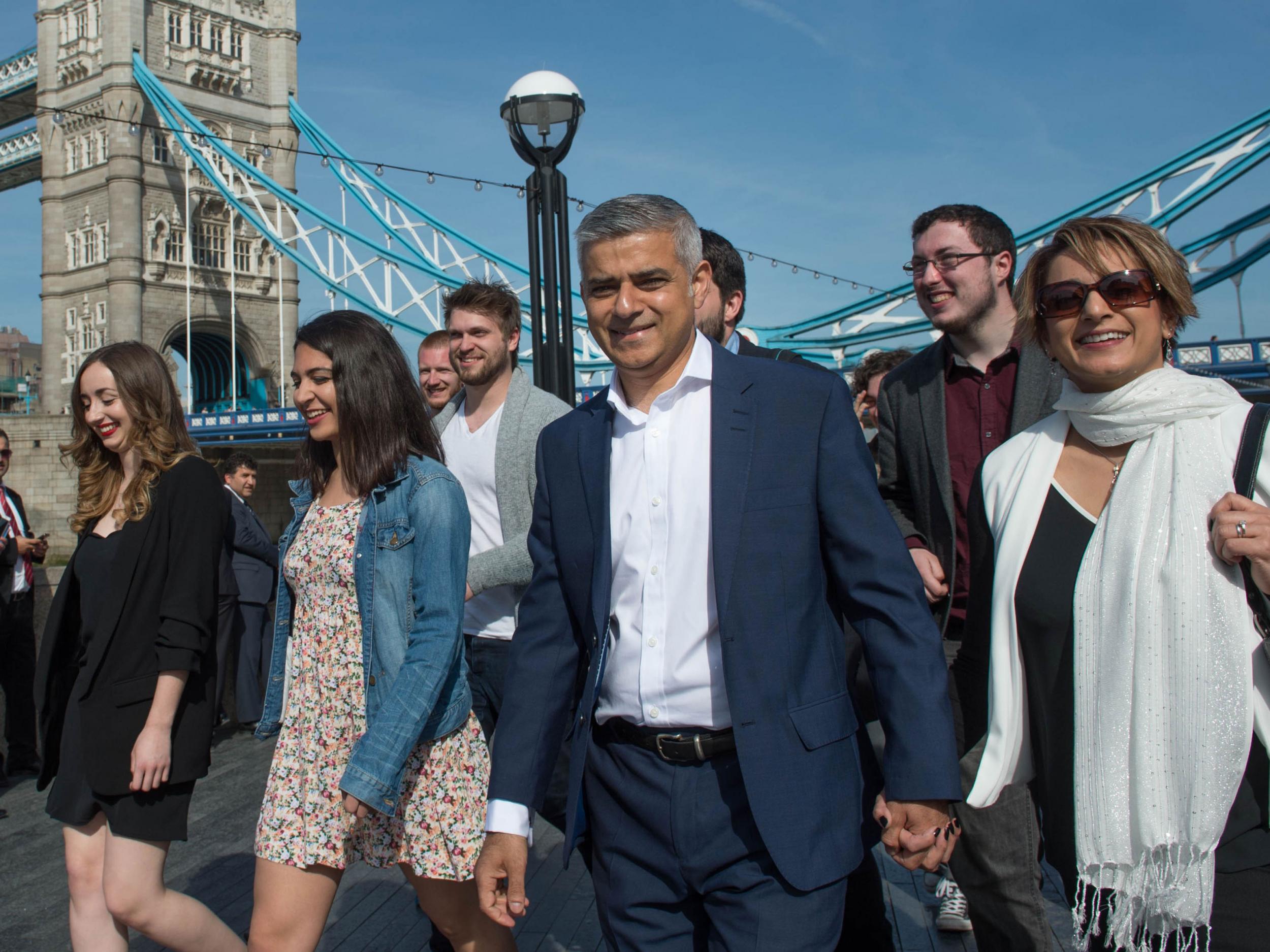Will Sadiq Khan be a 'mayor for all Londoners'?
Sadiq Khan's victory could be good news for Labour critics of Jeremy Corbyn – if the new London Mayor has time to play party politics alongside dealing with issues like housing and transport


Your support helps us to tell the story
From reproductive rights to climate change to Big Tech, The Independent is on the ground when the story is developing. Whether it's investigating the financials of Elon Musk's pro-Trump PAC or producing our latest documentary, 'The A Word', which shines a light on the American women fighting for reproductive rights, we know how important it is to parse out the facts from the messaging.
At such a critical moment in US history, we need reporters on the ground. Your donation allows us to keep sending journalists to speak to both sides of the story.
The Independent is trusted by Americans across the entire political spectrum. And unlike many other quality news outlets, we choose not to lock Americans out of our reporting and analysis with paywalls. We believe quality journalism should be available to everyone, paid for by those who can afford it.
Your support makes all the difference.The victory of Sadiq Khan, the new Mayor of London, did not only bring some relief for Jeremy Corbyn in a tricky set of elections. It also brought some hope for Corbyn’s Labour critics, who hope that Khan can his use his powerbase at City Hall to showcase pragmatic, effective policies and prove a good advert for a party desperately needing one after two bruising general election defeats.
Some Labour figures even talk of Khan becoming an alternative centre of power to Corbyn inside the party. After being elected as Labour’s candidate – a path eased by his decision to nominate Corbyn as Labour leader – Khan was quick to distance himself from Corbyn, declaring that he was his “own man” and not “anyone’s patsy”. He has every right to claim his victory as his own, not Corbyn’s.
Yet Corbyn’s critics may be disappointed; the new Mayor will have more than enough in his in-tray and little time to play internal Labour politics.
His immediate priority will be to live up to his campaign rhetoric by being “a mayor for all Londoners” and allying fears about him by being strongly pro-business. Khan also talked about a “32 boroughs strategy” rather than one targeting Labour’s core vote. That will now be his mantra for his four-year term.
Khan, the most powerful Muslim politician in Europe, has taken charge of a £17bn budget, with responsibility for transport, housing, planning and the police and fire services. More powers could be forthcoming if the Government lives up to its rhetoric on devolution.
But it is doubtful whether London will get the same powers over health that George Osborne has handed to his pet project in Manchester. Khan won’t necessarily get any favours from Tory ministers, who might have been more willing to go an extra mile for a Tory mayor. Osborne will not want to share the credit for big spending projects with a Labour one.
A big challenge for Khan, the son of a bus driver who rose to attend the Cabinet as Transport Minister, will be delivering his pledge to freeze bus and tube fares for four years, largely through "efficiency savings” at Transport for London. Such savings are easy to promise in an election and harder to find in office.
Another target in the spotlight – and easy to measure – is Khan’s pledge to ensure that 50,000 homes are built in the capital each year, half of them affordable.
He will need to work with developers rather than against them. One test of his muscle will be to get public authorities who own land to release it for housing.
Khan takes power at City Hall after a bruising election campaign in which the Conservatives, trailing in the opinion polls, threw every bit of mud at him they could muster in the hope that some would stick.
They, and Tory-supporting newspapers, deployed their stockpile of Khan’s alleged links with extremists, many of them tenuous.
Zac Goldsmith, the Tory candidate, described Khan as “radical and divisive". The Tories bombarded voters with an Indian background with messages that Khan would not keep their city safe.
They played up his links with Corbyn, warning that the Labour leader would use London as “a testing ground” for his radical ideas.
Despite some jitters in his campaign team, Khan took it calmly in public, telling Goldsmith: “There’s no need to keep pointing at me and shouting ‘he’s a Muslim’. I put it on my own leaflets.”
Some revelations were embarrassing, including a last-minute shot out of the Tory locker showing that in 2009 he described moderate Muslims as “Uncle Toms” – a slur thrown at blacks who are subservient to whites. He apologised swiftly.
In the end, the Tory attacks did not work. They may have had more impact elsewhere but seemed to backfire in a capital that proved more tolerant than the Tory leadership calculated.
Several leading Tories felt uncomfortable about a campaign that felt more “nasty party” than David Cameron’s “One Nation, compassionate Conservatism".
There is no doubt than Khan now has his dream job. In a hyperactive campaign, he showed more hunger for it than Goldsmith.
The third man to be elected London mayor has two hard acts to follow in Ken Livingstone and Boris Johnson. He starts the job with a lower profile than his predecessors. But the whole country will now be seeing a lot more of Khan.
Join our commenting forum
Join thought-provoking conversations, follow other Independent readers and see their replies
Comments